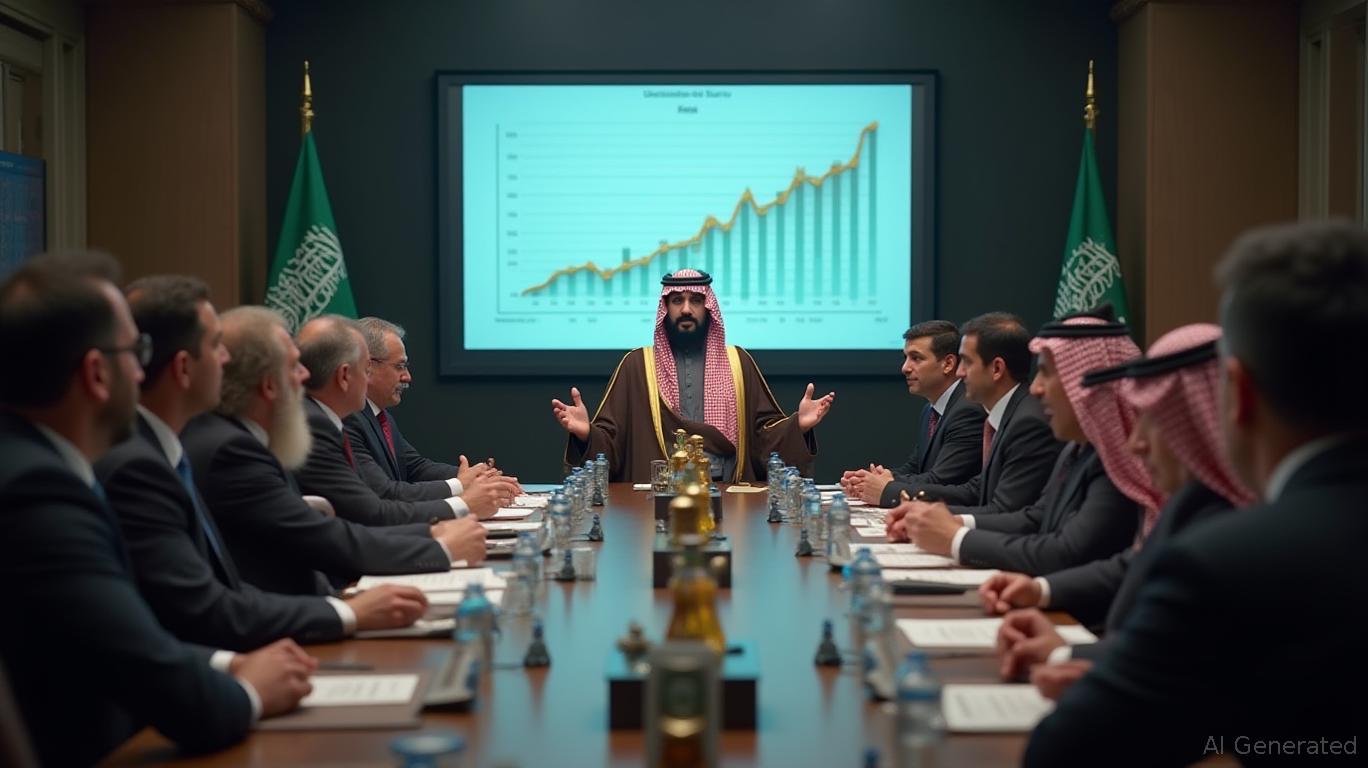Global shift to renewable energy slows down amid tariff disputes and Saudi Arabia's environmental goals
- Saudi Arabia advances 4.5 GW renewable projects under NREP, including record-low-cost solar/wind initiatives aligned with Vision 2030. - U.S. 50% tariffs on Indian goods and protectionist policies risk disrupting global energy collaboration, per Outlook India and PV Magazine. - Executive Order 14318 prioritizes nuclear/natural gas infrastructure, raising fossil fuel vs. renewables balance concerns in U.S. strategy. - Experts warn tariffs create artificial scarcity and inflate clean energy costs, threaten
Saudi Arabia is making significant progress with its large-scale renewable energy initiatives, even as a global conversation continues about how tariffs and trade restrictions may slow the shift to clean energy. The country has recently allocated 4.5 gigawatts (GW) of new renewable energy capacity through its National Renewable Energy Programme (NREP), featuring solar and wind projects at record-low costs, as reported by

The projects, with a combined value exceeding $2.4 billion, include the 1,500 MW Dawadmi Wind IPP and the 1,400 MW Najran Solar PV IPP, both achieving unprecedented low Levelised Cost of Energy (LCOE), according to Reuters. A partnership between
Yet, the worldwide transition to clean energy is being challenged by protectionist trade policies. Since 2023, the U.S. has imposed a 50% tariff on goods from India, a move New Delhi has criticized as "unfair and unreasonable," according to Outlook India. The two countries are close to finalizing a bilateral trade deal, with energy security becoming a central topic in the negotiations. Critics argue that such tariffs distort markets and discourage investment in clean energy, particularly in developing nations.
At the same time, changes in U.S. energy policy are opening new domestic opportunities.
Market responses to new energy alliances have also shown significant fluctuations. Shares of American Rebel Holdings (AREB) jumped 75% after announcing a strategic partnership in the energy sector, according to
Industry experts caution that tariffs and trade restrictions could slow down the global move toward clean energy. "Tariffs artificially limit supply and drive up prices at a time when rapid, scalable decarbonization is essential," said a source familiar with Saudi Arabia’s energy sector. The nation’s renewable projects, which depend on international engineering and construction firms such as Energy China and PowerChina, may encounter setbacks if supply chain issues intensify, as reported by
As Saudi Arabia and other countries pursue ambitious renewable energy goals, the relationship between trade policy and energy infrastructure will be increasingly important. With COP30 on the horizon, the urgency for unified global action—rather than fragmented trade restrictions—has never been greater.
Disclaimer: The content of this article solely reflects the author's opinion and does not represent the platform in any capacity. This article is not intended to serve as a reference for making investment decisions.
You may also like
Institutions Develop Blockchain Foundations, Signaling the Advancement of the Crypto Industry
- Institutional crypto adoption accelerates as venture funding, ETFs, and strategic acquisitions drive market maturation, per Cosmos Labs CEO Magnus Mareneck. - Coinbase's $375M Echo acquisition and BlackRock's $137.5M Ethereum/Bitcoin ETF inflows highlight infrastructure-building over speculation. - Cosmos emphasizes interoperability to support DeFi and tokenization, with partnerships enabling programmable banking and real-time settlements. - Mareneck warns of valuation risks (e.g., SEALSQ's 10.1x P/B rat

Solana News Update: Solana ETF Climbs While Token Declines: Institutional Demand Contrasts with Retail Outlook
- Bitwise's Solana Staking ETF (BSOL) raised $222.8M in assets on its 2025 debut, outpacing most new ETFs with $56M in first-day trading volume. - The fund offers direct Solana exposure with staking rewards, attracting institutional interest through a novel structure distinct from traditional spot ETFs. - SEC guidance on PoS and liquid staking enabled BSOL's launch, with Bitwise leveraging its European staking product experience to enter the U.S. market. - Despite BSOL's success, Solana's token price fell

Bitcoin Updates: The Crypto Market’s Psychological Maze Encounters AI’s Strategic Pathway Out
- Token Metrics AI Indices combat crypto volatility by using analytics to address psychological biases like FOMO and panic selling. - Bitcoin near $115,000 faces 2025-2026 price forecasts up to $500,000, driven by Fed rate cuts and U.S.-China cooperation boosting liquidity. - AI tools project $177,000–$427,000 BTC ranges based on market cap scenarios, while prioritizing risk mitigation through diversification and real-time monitoring. - Dynamic AI strategies balance growth and downside protection, using me

OceanPal’s Shift to AI and Blockchain Triggers 22.5% Drop in Share Price
- OceanPal Inc. pivoted to AI via a $120M investment in NEAR Protocol, launching SovereignAI to commercialize blockchain-based AI infrastructure. - The strategy targets 10% NEAR token ownership and leverages NVIDIA tech for confidential AI-cloud solutions, aligning with institutional interest in privacy-focused AI. - Despite continued shipping operations, OceanPal reported a $10.4M net loss and saw its stock drop 22.5% post-announcement, reflecting market skepticism about the strategic shift. - Backed by c
